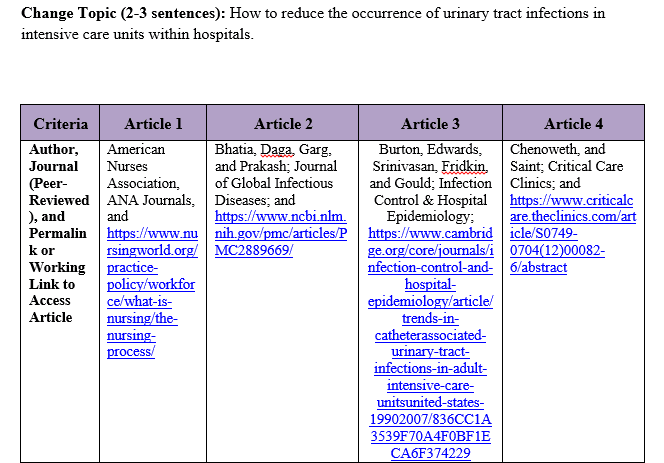Nursing practice
Details:
In nursing practice, accurate identification and application of research is essential to achieving successful outcomes. Being able to articulate the information and successfully summarize relevant peer-reviewed articles in a scholarly fashion helps to support the student’s ability and confidence to further develop and synthesize the progressively more complex assignments that constitute the components of the course change proposal capstone project.
For this assignment, the student will provide a synopsis of eight peer-reviewed articles from nursing journals using an evaluation table that determines the level and strength of evidence for each of the eight articles. The articles should be current within the last 5 years and closely relate to the PICOT statement developed earlier in this course. The articles may include quantitative research, descriptive analyses, longitudinal studies, or meta-analysis articles. A systematic review may be used to provide background information for the purpose or problem identified in the proposed capstone project. Use the “Literature Evaluation Table” resource to complete this assignment.
While APA style is not required for the body of this assignment, solid academic writing is expected, and in-text citations and references should be presented using APA documentation guidelines, which can be found in the APA Style Guide, located in the Student Success Center.
This assignment uses a rubric. Please review the rubric prior to beginning the assignment to become familiar with the expectations for successful completion.
You are not required to submit this assignment to LopesWrite.
NRS-490-RS-
8 ARTICLES
American Nurses Association, Nursing World. The Nursing Process (2009). American Nurses Association. http://www.
Bhatia, N., Daga, M. K., Garg, S., & Prakash, S. K. (2010). Urinary Catheterization in Medical Wards. Journal of Global Infectious Diseases, 2(2), 83–90
Burton, Deron C DC (2011). “Trends in catheter-associated urinary tract infections in adult intensive care units – United States, 1990-2007.”. Infection control and hospital epidemiology (0899-823X), 32 (8), p. 748.
Chenoweth, C., & Saint, S. (2013). Preventing catheter-associated urinary tract infections in the intensive care
Conway, L. J., Pogorzelska, M., Larson, E., & Stone, P. W. (2012). Adoption of policies to prevent catheter-associated urinary tract infections in United States intensive care units. American journal of infection control, 40(8), 705-710.
Magill, S. S., Edwards, J. R., Bamberg, W., Beldavs, Z. G., Dumyati, G., Kainer, M. A., … & Ray, S. M. (2014). Multistate point-prevalence survey of health care–associated infections. New England Journal of Medicine, 370(13), 1198-1208.
Marra et al., (2011), Preventing catheter-associated urinary tract infection in the zero-tolerance era, American Journal of Infection Control, Volume 39, Issue 10, December 2011, Pages 817-822, ISSN 0196-6553.
Solution preview for the order on nursing practice
